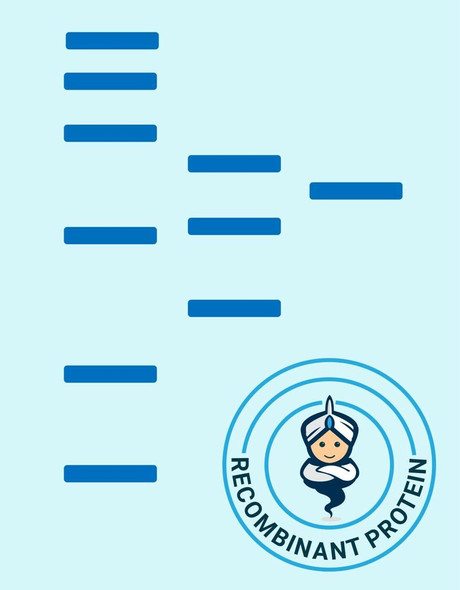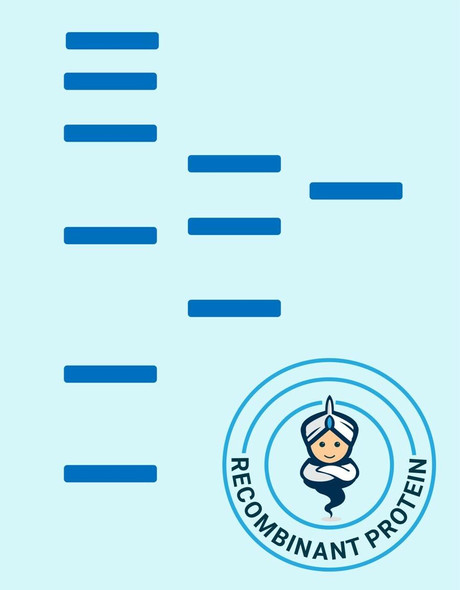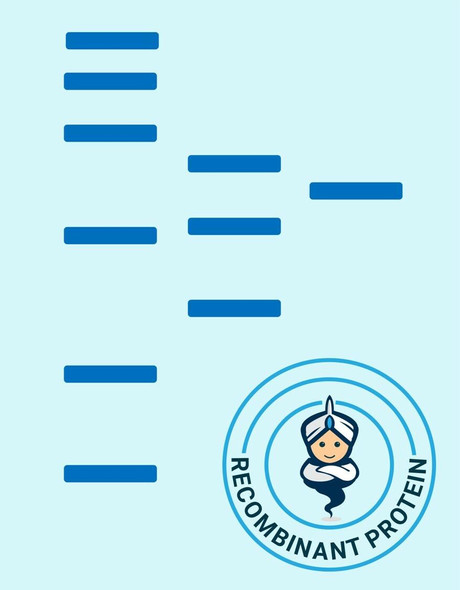Description
| Product Name: | Human BCL2L2 Recombinant Protein |
| Product Code: | RPPB2875 |
| Size: | 25µg |
| Species: | Human |
| Target: | BCL2L2 |
| Synonyms: | B-Cell Lymphoma Protein 2, BCL2 Like 2, BCL2 Like protein 2, BCLW, Bcl2-L-2, Apoptosis regulator Bcl-W, BCL2L2, BCL-W, KIAA0271. |
| Source: | Escherichia Coli |
| Physical Appearance: | Sterile filtered colorless solution. |
| Formulation: | The BCL2L2 protein solution contains 20mM Tris-HCl, pH-8, 100mM NaCl and 10% glycerol. |
| Stability: | Store at 4°C if entire vial will be used within 2-4 weeks. Store, frozen at -20°C for longer periods of time. For long term storage it is recommended to add a carrier protein (0.1% HSA or BSA).Avoid multiple freeze-thaw cycles. |
| Purity: | Greater than 95.0% as determined by SDS-PAGE. |
| Amino Acid Sequence: | MGSSHHHHHH SSGLVPRGSH MATPASAPDT RALVADFVGY KLRQKGYVCG AGPGEGPAAD PLHQAMRAAG DEFETRFRRT FSDLAAQLHV TPGSAQQRFT QVSDELFQGG PNWGRLVAFF VFGAALCAES VNKEMEPLVG QVQEWMVAYL ETRLADWIHS SGGWAEFTAL YGDGALEEAR RLREGNWASV RT |
BCL2L2 promotes cell survival and blocks dexamethasone-induced apoptosis. BCL2L2 mediates survival of postmitotic Sertoli cells by suppressing death-promoting activity of BAX. BCL2L2 is part of the BCL-2 protein family which form hetero- or homodimers and play an important role as anti and proapoptotic regulators. BCL2L2 causes reduced cell apoptosis under cytotoxic conditions. BCL2L2 is involved in the survival of NGF- and BDNF-dependent neurons. BCL2L2 plays an important role in adult spermatogenesis.
BCL2L2 Human Recombinant produced in E.Coli is a single, non-glycosylated polypeptide chain containing 192 amino acids (1-172 a.a.) and having a molecular weight of 20.9kDa.The BCL2L2 is fused to a 20 a.a His-Tag at N-terminus and purified by proprietary chromatographic techniques.
| UniProt Protein Function: | Promotes cell survival. Blocks dexamethasone-induced apoptosis. Mediates survival of postmitotic Sertoli cells by suppressing death-promoting activity of BAX. |
| NCBI Summary: | This gene encodes a member of the BCL-2 protein family. The proteins of this family form hetero- or homodimers and act as anti- and pro-apoptotic regulators. Expression of this gene in cells has been shown to contribute to reduced cell apoptosis under cytotoxic conditions. Studies of the related gene in mice indicated a role in the survival of NGF- and BDNF-dependent neurons. Mutation and knockout studies of the mouse gene demonstrated an essential role in adult spermatogenesis. Alternative splicing results in multiple transcript variants. Read-through transcription also exists between this gene and the neighboring downstream PABPN1 (poly(A) binding protein, nuclear 1) gene. [provided by RefSeq, Dec 2010] |
| UniProt Code: | Q92843 |
| NCBI GenInfo Identifier: | 296434404 |
| NCBI Gene ID: | 599 |
| NCBI Accession: | Q92843.2 |
| UniProt Secondary Accession: | Q92843,Q2M3U0, Q5U0H4, A8K0F4, |
| UniProt Related Accession: | Q92843 |
| Molecular Weight: | 37,171 Da |
| NCBI Full Name: | Bcl-2-like protein 2 |
| NCBI Synonym Full Names: | BCL2 like 2 |
| NCBI Official Symbol: | BCL2L2�� |
| NCBI Official Synonym Symbols: | BCLW; BCL-W; PPP1R51; BCL2-L-2�� |
| NCBI Protein Information: | bcl-2-like protein 2 |
| UniProt Protein Name: | Bcl-2-like protein 2 |
| UniProt Synonym Protein Names: | Apoptosis regulator Bcl-W |
| Protein Family: | Bcl-2-like protein |
| UniProt Gene Name: | BCL2L2�� |
| UniProt Entry Name: | B2CL2_HUMAN |









